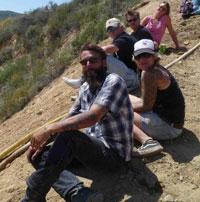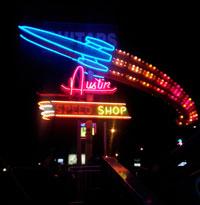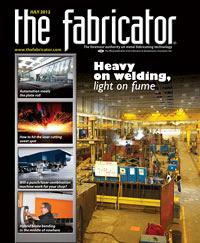- FMA
- The Fabricator
- FABTECH
- Canadian Metalworking
Categories
- Additive Manufacturing
- Aluminum Welding
- Arc Welding
- Assembly and Joining
- Automation and Robotics
- Bending and Forming
- Consumables
- Cutting and Weld Prep
- Electric Vehicles
- En Español
- Finishing
- Hydroforming
- Laser Cutting
- Laser Welding
- Machining
- Manufacturing Software
- Materials Handling
- Metals/Materials
- Oxyfuel Cutting
- Plasma Cutting
- Power Tools
- Punching and Other Holemaking
- Roll Forming
- Safety
- Sawing
- Shearing
- Shop Management
- Testing and Measuring
- Tube and Pipe Fabrication
- Tube and Pipe Production
- Waterjet Cutting
Industry Directory
Webcasts
Podcasts
FAB 40
Advertise
Subscribe
Account Login
Search
Beyond the “signage” quo
Custom sign-maker opts for big and bold over bland and boring
- By Amanda Carlson
- July 30, 2012
- Article
- Plasma Cutting

Jay Gordon (front), Darcy Hanna, Zach Forester, Jonathen Whittaker, and Shay Miller make up the Blackout Signs & Metalworks team.
When the opportunity presented itself to design a trophy for a car show held in conjunction with the Orion Music + More festival hosted by legendary band Metallica, Jay Gordon, owner of Blackout Signs & Metalworks, San Marcos, Texas, knew it was right in his wheelhouse.
He was confident that he could design and fabricate something that captured the essence of Metallica while also honoring the intended recipients. After all, he and his small five-man shop have come through for high-profile clients like Red Bull, Lollapalooza, and Whole Foods before. Why should this be any different?
Turns out Gordon’s confidence was warranted. His trophy, with a design inspired by the Flying V guitar and elements from 1950s automobile hood ornaments, won the favor of the band. But it’s really not that surprising. When someone takes the time to delve beneath the layers and get to the root as Gordon and his shop do, the success and the resulting loyal client base just seem to make sense.
This, in a nutshell, is the story behind the little sign shop that could, of how a little bit of good luck mixed with confidence, fearless creativity, tireless work ethic, and penchant for true old-school craftsmanship have allowed Blackout to carve a niche for itself in the world of specialty signs.
Combining Metalworking With Painting and Art
Gordon will be the first to tell you that his shop and vision for signs isn’t for everyone. He and wife Darcy Hanna, Shay Miller, Zach Forester, and intern Jonathen Whittaker want to push the limits of creativity in the art of sign fabricating and painting, opting for big and bold over bland and boring. The inspiration goes back to Gordon’s affinity for artists like Von Dutch, Ed Roth, and Robert Williams.
After apprenticing under a sign-maker, where he overqualified himself to get hired, Gordon lost touch with the trade for a while, taking jobs at a print shop and a machine shop before staring a construction company with a friend.
“We were doing some commercial project and I was asked to weld up some metal brackets. So I welded up the brackets and the railings and the contractor told me that I was a way better welder and fabricator than I was a carpenter. I agreed. But at the time, construction was what was putting food on the table,” Gordon explained.
That got his gears grinding to the point that the company started offering welding services and sign painting on top of construction. When he realized he was having more fun with the add-on business than he was with construction, Gordon left and formed Blackout Signs & Metalworks.
It’s been a stand-alone company for five years that specializes in custom signage, architectural ironwork, event site enhancements, and prototype work.
Finding Perfection in the Imperfections
You won’t find any high-tech, fancy equipment at Blackout. Their most prized possessions include a Scotchman ironworker, a couple of Miller Electric welding power sources, a manual plasma cutting unit, drills, hammers, shears, brakes, and jigsaws. Gordon tried incorporating a CNC cutting machine but realized he can get the job done by hand faster. Plus, fabricating by hand lends a subtle imperfection to each piece that Gordon said gives their work a swing and a pop that can’t be duplicated with CNC machines.
Working with paper patterns and building things by hand gives the fabrications more of an organic feel, Gordon added.
“Computers make things so perfect and spot-on, which is great if you’re doing 500 of something, but I don’t believe it makes it better.”
And doing things the old-fashioned way is what makes it fun. They like to think of themselves as an art studio as much as a sign shop. When the shop first opened, Gordon and his team sometimes found it difficult to reel themselves in once they got going on a project. Too often Gordon found himself including spontaneous add-ons, and in the end they’d lose money on the project. They’ve discovered their boundaries since then, but it was a learning experience that Gordon doesn’t seem to regret, explaining that going overboard on a few projects “might have been bad business, but it was good for the heart and soul.”
Blackout’s loyal clientele has grown because when it becomes evident that each project is handled with care, that word travels fast. Blackout’s goal is to exceed expectations, and it does more often than not. That’s why a 5-year-old company has been able to acquire and retain high-profile clients and secure smaller, local clientele that wants signage that doubles as a work of art.
“Signage is such a cool way to support the love of metalworking, the love of painting, and the love of art. We’re making a living out of combining all of those into one thing. There are very few artistic endeavors that allow you to make a decent living, but signage for me has done well in providing for me and my family and everyone else in the shop.”
About the Author

Amanda Carlson
2135 Point Blvd
Elgin, IL 60123
815-227-8260
Amanda Carlson was named as the editor for The WELDER in January 2017. She is responsible for coordinating and writing or editing all of the magazine’s editorial content. Before joining The WELDER, Amanda was a news editor for two years, coordinating and editing all product and industry news items for several publications and thefabricator.com.
subscribe now

The Fabricator is North America's leading magazine for the metal forming and fabricating industry. The magazine delivers the news, technical articles, and case histories that enable fabricators to do their jobs more efficiently. The Fabricator has served the industry since 1970.
start your free subscription- Stay connected from anywhere

Easily access valuable industry resources now with full access to the digital edition of The Fabricator.

Easily access valuable industry resources now with full access to the digital edition of The Welder.

Easily access valuable industry resources now with full access to the digital edition of The Tube and Pipe Journal.
- Podcasting
- Podcast:
- The Fabricator Podcast
- Published:
- 04/16/2024
- Running Time:
- 63:29
In this episode of The Fabricator Podcast, Caleb Chamberlain, co-founder and CEO of OSH Cut, discusses his company’s...
- Trending Articles
Tips for creating sheet metal tubes with perforations

Supporting the metal fabricating industry through FMA

JM Steel triples capacity for solar energy projects at Pennsylvania facility

Are two heads better than one in fiber laser cutting?

Fabricating favorite childhood memories

- Industry Events
16th Annual Safety Conference
- April 30 - May 1, 2024
- Elgin,
Pipe and Tube Conference
- May 21 - 22, 2024
- Omaha, NE
World-Class Roll Forming Workshop
- June 5 - 6, 2024
- Louisville, KY
Advanced Laser Application Workshop
- June 25 - 27, 2024
- Novi, MI



























